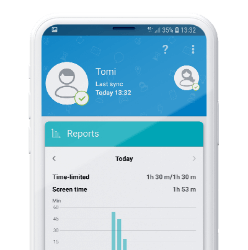Is your child's phone making them sick?
Gadgets provide immense learning opportunities and entertainment, but they have also introduced a new challenge for parents and educators: phone addiction among children.
Children are likely to spend more time online than usual during the school holidays, keeping in touch with friends and staying up to date with the latest online trends. So, Summer is a great time to engage in meaningful conversations about the online world.
If your child ever encounters a distressing situation online, these discussions can give them the confidence to share it with you. To facilitate such open dialogues, consider using our handy conversation starters.
Many young people will use the summer holiday to stay connected with friends via social networking sites or online games. Now is the time to inquire about the platforms they use and verify if they meet the age requirements - most social media platforms require users to be at least 13.
Encourage your child to leverage privacy tools on the platforms they use, ensuring that their posts are visible only to trusted individuals.
Your child may likely want to share their summer adventures online, so it is important to discuss what types of photos are suitable for sharing and who they should share them with. Photos can unintentionally reveal personal information, so it's essential to be cautious. Always ask your children's permission before sharing their photos online - 40% of 8-17s were embarrassed by a photo their parents or carers posted last year.
With fewer structured activities on offer and less parental guidance thanks to work commitments, it's understandable that children turn more readily towards tablets and smartphones - they provide entertainment, connection with friends, access to online education tools, and parents can rest assured their kids are staying safe at home. But is all this extra screen time really beneficial for their development?
Here are some tips to help:
Learn more about reducing screentime here.
A family agreement is a fantastic way to initiate a discussion about online behaviour and create guidelines that everyone agrees on. The agreement includes promises - positive affirmations about how your family will protect each other online and treat others with respect. Summer is an ideal time to sit down as a family and establish these promises.
Above all, make this summer memorable and enjoyable!
For more online sadety tips for the summer, watch this short video by Internet Matters.
Digital Matters is a free and easy-to-use resource created to help keep your child stay safe in an increasingly digital world. Interactive quizzes and dynamic story-based learning can help you bring to life important topics such as healthy online behaviours, keeping personal information secure and cyberbullying. The activities are aligned with the UKCIS’ Education for a Connected World Framework.


With ESET Parental Control for Android
TRY FREE FOR 30 DAYSGadgets provide immense learning opportunities and entertainment, but they have also introduced a new challenge for parents and educators: phone addiction among children.
Together with child psychologist Jarmila Tomková, we've prepared some FAQs and common parental worries regarding excessive internet use. Find out why such habits might be problematic—after all, your children might not be the only ones in your household with these habits—and learn how to address and improve them.
The internet is a place of many possibilities. But when the online world starts to take up too much space in your child’s life, it can be an issue. What are the different types of internet addiction? And how can you help children who are struggling with internet overuse? We discuss the topic with child psychologist, Jarmila Tomkova.